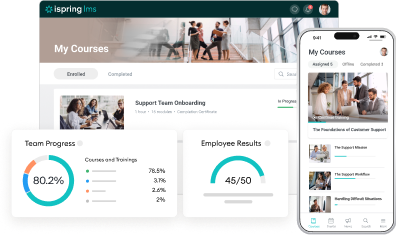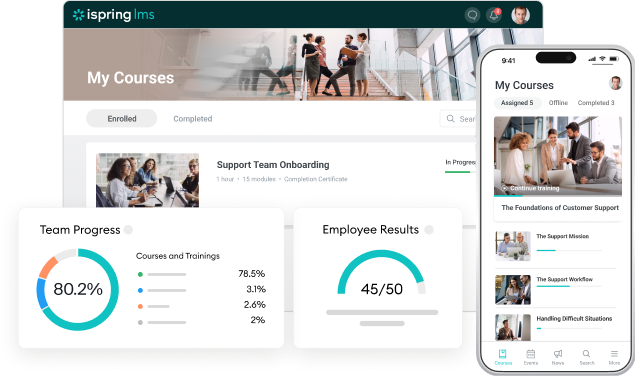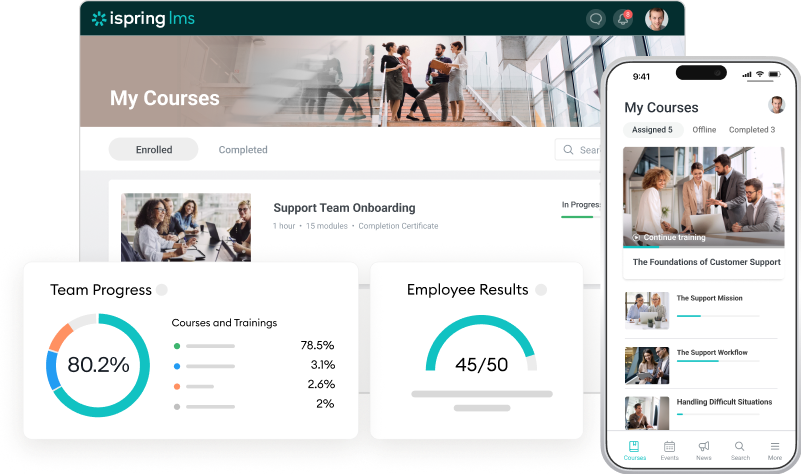8 Best Kajabi Alternatives for Selling Online Courses

If you sell courses online, you’ve probably heard of or even tried Kajabi — a knowledge business platform packed with features that help creators design courses, coaching products, and podcasts, and sell them online.
While this is a popular choice, some users are looking for Kajabi alternatives due to its high price point, especially for those just starting out, and the need for more customization to better match their unique branding.
In this article, we’ll look at the eight best Kajabi alternatives that are worth exploring in 2026, along with their standout course features, pros and cons, and pricing. Read on!
Kajabi Overview
Before we dive into the more comprehensive and cheaper alternatives to Kajabi, let’s take a look at what Kajabi is and how it works.
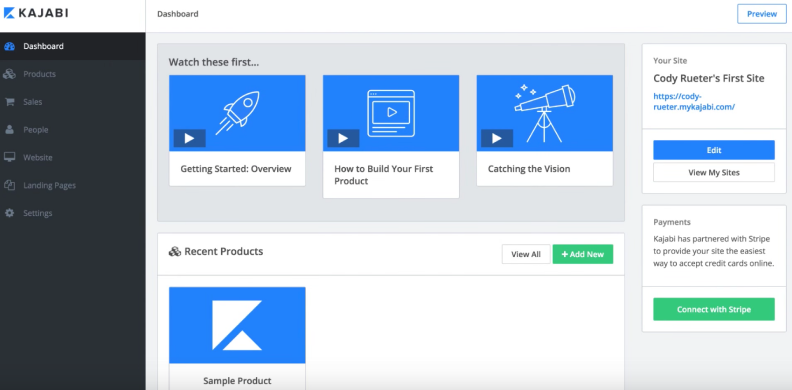
Kajabi markets itself as a knowledge commerce platform that helps you build a successful online business. It provides a suite of tools for creating, promoting, and selling digital products. With Kajabi, you can build a customized website, launch marketing campaigns, and run a membership site.
The platform was designed more for selling individual content items than structured courses. Still, you can create course documents, presentations, images, and audio files. It’s also possible to add videos that will be hosted on Wistia and enhance courses with student assessments. However, some users say in reviews that the course editor is not very intuitive.
Kajabi has a great focus on marketing options. It contains built-in templates for landing pages, allows for hosting webinars and managing marketing campaigns. You can build a sales pipeline by easily stringing together landing pages, email sequences, and offers. Kajabi also has a blogging module, so you don’t need to link to a completely different site to promote your products with content marketing.
For those who just want to sell an online course — and who already have an online business structure powered with a website and marketing tools — this can be total overkill. However, if you’re just starting and want everything in one place, then this platform may be a good choice.
Standout features
- Premier website builder. An efficient sales page builder that’s easy to use with tons of layout presets to start you off right. It includes drag-and-drop capabilities and many modules or block types that can be added to your layout.
- Pipeline blueprints. These are pre-built templates specifically designed to handle sales campaigns and product launches that allow you to build fully automated marketing campaigns with the click of a button.
- An integrated CRM. Keep all your contacts organized in one place. Trigger emails, coupons, and product access with simple rules you only have to set once.
- AI tools. Use an AI assistant that can create online courses, structure your lessons, write social media posts, and build marketing campaigns.
- Video hosting. By uploading your videos to Kajabi, you’ll have them encoded and delivered by Wistia for speed and security.
Pros
- No % cut of your revenue
- Native mobile app (iOS and Android) for both creators and customers
- Integrations with payment, email, and analytics tools
- Instructor-led training support for running webinars right on the platform
- Extensive library of customizable templates for different digital products
Cons
- Not intended for selling physical products
- 24/7 support is only included in the Growth and Pro plans
Best for
Kajabi is a great course platform that’s most suited for individuals that want to sell their knowledge and have all the necessary tools under one roof. However, it doesn’t come cheap, so for those who are not going to build a serious business around online courses, it may not be worth the investment.
Pricing
There are four plans depending on the features you need. If you pay annually, the prices are:
- Kickstarter — $55/month.
- Basic — $119/month.
- Growth — $159/month.
- Pro — $319/month.
Now, let’s have a look at some top-notch and more affordable Kajabi alternatives.
1. iSpring LMS
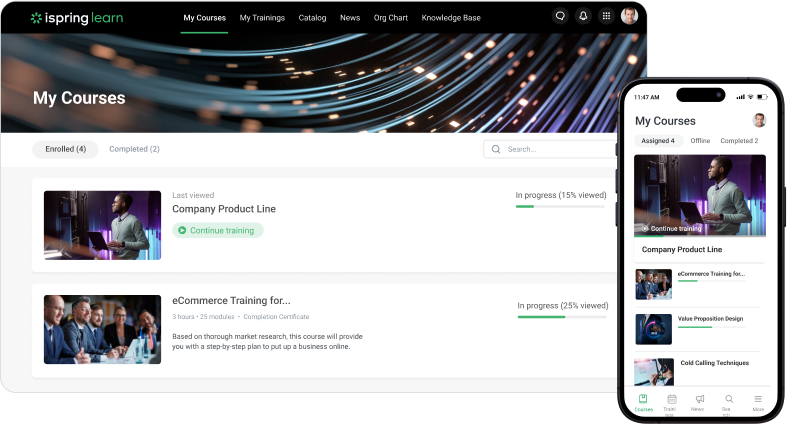
iSpring LMS is an intuitive and feature-rich learning management system that can also serve as a perfect online training center for companies and instructors that want to launch course marketplaces quickly and easily.
One of the biggest advantages of iSpring LMS is the built-in course creation tool designed to help subject matter experts quickly pack their expertise into polished courses right on the platform. Moreover, the LMS also comes with a comprehensive, AI-enhanced drag-and-drop course builder, iSpring Suite, that helps you create virtually any type of eLearning content and upload it to the learning platform quickly.
With a native integration with Shopify, iSpring LMS allows you to create an online storefront, handle transactions, and automate the enrollment process with ease. You can market your courses, track sales, and offer a streamlined purchasing experience to your customers.
Its advanced analytics include 25+ pre-built, scheduled LMS reports, plus an opportunity to create custom ones, which can help you identify what needs to be improved in a course and increase profits, as well as a visually clear supervisor dashboard that allows you to see the big picture at a glance.
Standout features
- Powerful course creation. There’s no need to buy a separate course builder. Create professional courses with dynamic quizzes, training videos and screencasts, role-play simulations, interactions, voice-overs, and more.
- Learning tracks. Combine different courses into sequential learning paths to create a training program consisting of chapters with strict deadlines.
- Blended learning support. Conveniently plan both online and live learning sessions in a single calendar. Launch live webinars and live seminars via Zoom, Google Meet, or CourseBoost platform integrations with the LMS.
- Gamification. Award learners with points, badges, and certificates. Create an atmosphere of healthy competition and let course takers see their progress in leaderboards.
- White-label. Customize the look and feel of the LMS with a brand logo, signature color scheme, unique domain, and a tailored mobile learning app.
Pros
- 24/7 technical support via phone, chat, or email
- Integrations with Shopify and Tilda Publishing
- Native mobile apps for both iOS and Android with offline learning support
- Unlimited courses, admins, users, and learner groups
- Quick setup with minimal training, a highly intuitive interface
Cons
- No non-profit or academic discounts
- No free plan
Best for
iSpring LMS is one of the best Kajabi alternatives and can be the ideal solution for training centers and businesses focused on selling comprehensive courses or certification training programs to organizations or individuals.
Pricing
The pricing structure depends on the number of active users who access the platform per month:
- 300 users — $4.46 user/month.
- 500 users — $3.97 user/month.
- 1000 users — $3.58 user/month.
Billed annually. You can check out the platform firsthand during a free 30-day trial.
Also read:
- How to Sell Courses on Shopify →
- How to Make Money Selling Courses Online →
- How to Price Your Online Course →
2. Teachable
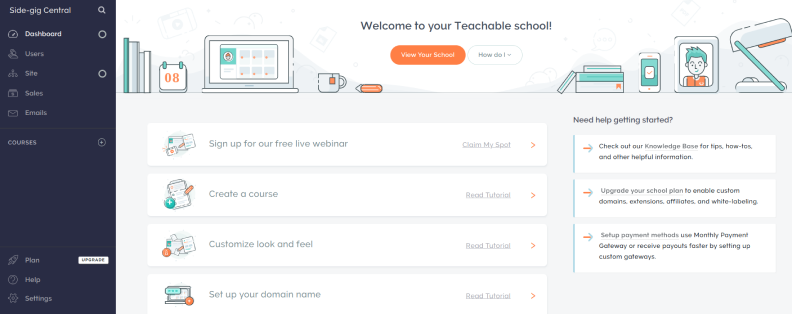
Teachable is one of the price-friendly alternatives to Kajabi that lets you sell your courses from your own site with your own branding.
In Teachable, setting up a course is pretty straightforward with a course builder. Courses are organized as “sections” filled with “lectures”. Lectures can consist of multimedia files (video, audio, and images), PDF documents and text, and multiple choice quizzes that you can create right on the platform. There’s also an “Add Code” option that allows for embedding live video streams or webinars directly into a lecture.
To start selling, you need to create the website where your courses will live. You can set it up quickly with the intuitive drag-and-drop builder. The platform offers a range of options for configuring and branding the site. However, you need to be tech-savvy if you want to completely change the look of the site. It also enables you to choose between different hosting options – the Teachable free domain, your own domain name, or a subdomain.
With Teachable, you can create various pages, such as an affiliate sign up/refund policy and others. Like Kajabi, it also lets you create blog posts, which is a great way for new people to find you. Marketing options include discount coupons, time-limited offers, bundles, affiliate program, and tracking pixels.
Unlike many other platforms, Teachable offers a free pricing plan. However, you have to pay $1 plus a 10% transaction fee whenever you sell a course. You still need to pay a 5% transaction fee on all sales with the Basic paid plan.
Standout features
- Custom domain. You can connect a custom domain to your school or create a subdomain.
- Flexible pricing. You can sell a subscription, charge a one-time fee, or set up a payment plan, and offer bundled courses.
- Marketing integrations. You can integrate your school with MailChimp, Mixpanel, AWeber, Infusionsoft, and other marketing tools via Zapier.
- Tracking pixels like Facebook Pixel. You can increase your advertising’s effectiveness by adding conversion pixels to your site.
- Tax collection. The platform builds VAT into course sellers’ pricing, simplifying their tax-reporting obligations.
Pros
- Supports multiple question types and allows graded and ungraded quizzes
- 0% transaction fees in all plans, except the Basic plan
- Unlimited students in all plans
- Groups and discussion boards for social learning that let students interact with each other
- Prevents learners from skipping over content, ensuring that they watch at least 90% of each video
Cons
- Basic progress tracking, including quiz scores and video heat maps
- Bulk student import is only available in the Enterprise plan
Best for
Teachable is the best course platform for businesses and knowledge entrepreneurs that want to sell online courses on their branded website but are satisfied with basic course-building options and don’t need to play interactive content.
Pricing
You can choose from four plans:
- Basic — $39/month.
- Pro — $119/month.
- Pro+ — $199/month.
- Enterprise — custom.
Billed annually.
3. Podia
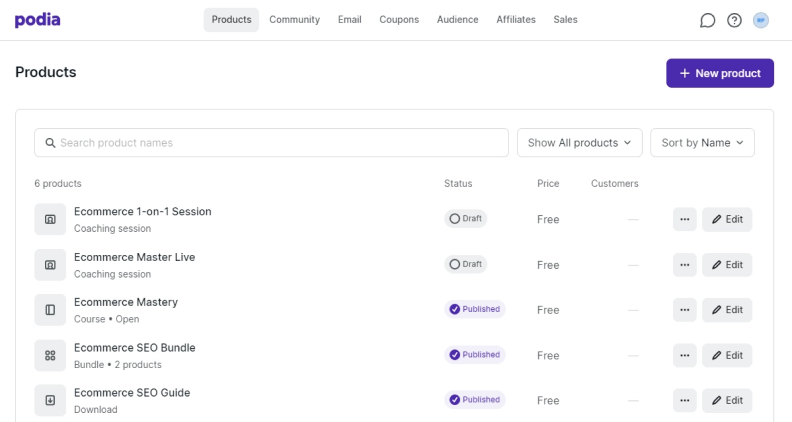
Podia is an all-in-one online selling platform that lets you sell online courses, digital downloads, and memberships. This is a Kajabi alternative that, by contrast, has a list of unlimited features, including unlimited courses, products, customers, emails sent, sales, and files hosted.
Podia is more focused on selling digital products like e-books, video courses, audio files, PDF checklists, etc., than on complex courses. Still, it has a basic course builder that allows you to create plain one-tier structured online courses from documents, images, video, and audio. With Podia, you don’t need to get Wistia or Vimeo, because it supports unlimited video hosting.
The platform has an intuitive website builder that offers you an “all-in-one” experience, meaning the entire sales funnel. You can build a professional-looking site and add any kind of pages you need, including a storefront, sales pages, contact page, and more, and customize them to match your brand or build something from scratch with flexible design options.
As for marketing features and selling options, Podia has everything you need for effective email marketing and allows for offering bundles of digital products, coupons, upsells, and cross-sells, If you choose a higher pricing plan, you can start working with affiliate partners and enable a blog on the platform to attract new customers.
Standout features
- Built-in email marketing platform. You can fully manage email marketing within the platform and even provide drip campaigns.
- Affiliate marketing. You can start offering online courses to your affiliate marketers and give them a commission for selling your products.
- Product bundling. This allows you to bundle online courses with digital downloads to incentivize students to buy more.
- Integrations. You can connect Facebook Pixel, Google Analytics, Mailchimp, HotJar, and other apps to power your online business.
- Blogging. Podia includes an SEO blog with unlimited posts on every plan so you can share your expertise and update and drive more traffic to your products.
Pros
- Easy and beginner-friendly interface
- Supports live events and webinars through Zoom and YouTube Live
- The Podia Email platform is included for free in both plans (up to 100 subscribers)
- Solid 24/7 support via chat and email in all plans
- An opportunity to create communities with free and paid membership tiers
Cons
- Basic customization with limited options, no HTML/CSS access
- Quizzes are limited to multiple-choice questions
Best for
If you are an entrepreneur or an individual creator who wants to sell digital products and are looking for a Kajabi all-in-one alternative, the Podia online course platform could be one of the best Kajabi alternatives for you. However, it lacks the features of a fully functional LMS and is not the best option for training centers with an academic focus.
Pricing
There are two plans to choose from:
- Mover plan — $39/month.
- Shaker plan — $75/month.
Billed annually.
4. Thinkific
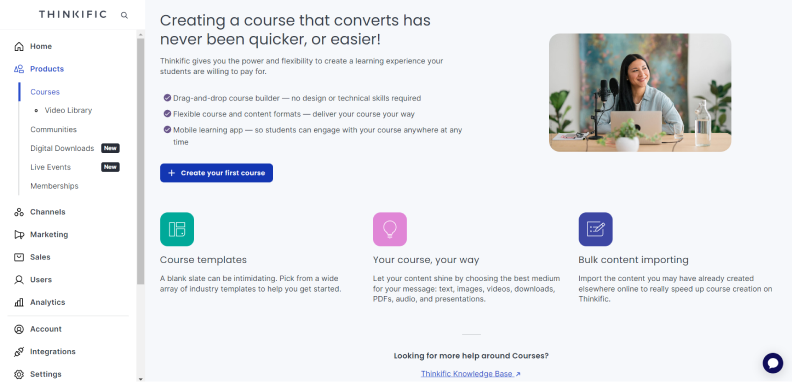
Thinkific is a platform for creating, promoting, and selling online courses while supporting your brand and owning your customer base. It provides a robust feature set for website and course building and integrations with business and marketing apps.
With Thinkific, you can set up a homepage for your course site and create as many custom sales pages as you want. Though you don’t have full control over customization (for example, you can’t install CSS), you can change brand elements and modify various sections on each page. You can also connect your training website with the other site you have using a custom domain.
To set up an online course, you can create “Chapters” and fill them with learning materials. The platform allows for making video, text, presentation, and PDF lessons, as well as quizzes and surveys, which you can create right in Thinkific’s editor. The videos are hosted through Wistia. You can also embed links on YouTube or Vimeo and platforms like Brillium Exams, H5P by using iFrame.
A few other capabilities of Thinkific are features like analytics, tracking, and email marketing, along with support for over 1,000 external apps. However, they’re available only for users of paid pricing plans.
Thinkific also offers a free plan but you have to pay a 10% transaction fee for each sale. With the Basic paid plan, the fee is reduced to 5%.
Standout features
- Learner-focused. You can create customized learning environments and course landing pages for various types of learners.
- Integrations. The platform can be integrated with more than 100 external business and marketing tools.
- Flexible pricing options. You can charge students monthly fees for access to all content or split the full course price over several monthly payments.
- Sales widgets. Create small, customizable course cards or buttons to market your programs on other websites to let people buy your course from anywhere.
- Thinkific community. Create an opportunity for deeper student discussions outside of course content. Each community you create will have a section on your Thinkific website.
Pros
- You can package your courses, communities, courses’ digital downloads, or coaching programs into one bundle
- A variety of payment options including Affirm, Klarna, and AfterPay, as well as Apple Pay, Google Pay, and more
- Supports digital downloads like eBooks, guides, templates, and more to drive new leads and boost your revenue quickly
- Coupons, promotions, and discounts are available
- An intuitive site builder that doesn’t require tech or design experience
Cons
- No native live streaming: requires third-party integrations like Zoom for live content delivery
- Most of the pricing plans don’t support SCORM, a global eLearning standard
Best for
The Thinkific online course platform is one of the best Kajabi alternatives for companies and solopreneurs that are focused on building a brand around online courses and need a whole set of tools to promote their business.
Pricing
Thinkific offers a custom plan for companies and three plans for individuals:
- Basic — $36/month.
- Start — 74/month.
- Grow — 149/month.
Billed annually. Thinkific also offers a free plan, which makes it one of the best free Kajabi alternatives.
5. Ruzuku
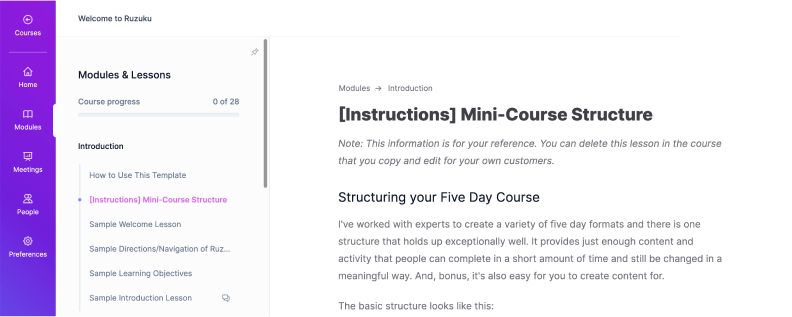
Ruzuku is another Kajabi alternative that focuses on the simplicity of course building and communication tools.
The course creator platform has a course editor that allows you to lay out the structure of your online courses quite simply by adding activities. Activities can take the form of text, images, audio, and video lessons. You can also upload PDFs, Word, and PPT documents.
Ruzuku also lets you add a discussion forum to every single lesson. Forums can be helpful to stimulate discussion among learners and encourage them to contribute to your online courses by uploading additional resources.
If you are a user of the Up-and-Comer or University price plans, you can also add polls and quizzes to your online courses and host webinars and live teleconferences.
Selling and marketing options include multiple price points for each course, subscriptions, and customized coupons on each payment type.
Standout features
- Multiple content formats. Rusuku supports a variety of multimedia course content, including PDFs, video, audio, handouts, and more.
- Social learning. The platform includes online community features that allow learners to interact with each other and the course instructor.
- Global Content Delivery Network (CDN). Your learning materials are distributed via CDN for faster learner experience.
- Discussion forums. Learners can teach each other by sharing useful resources (images, PDFs, and videos) in their responses.
- Learner community platform. Students have social profiles, bios, and photos in the course community.
- Webinars and teleconferences. You can mix up training via online courses with webinars and teleconferences.
Pros
- No transaction fees
- Unlimited courses, students, and data storage
- Comprehensive and friendly support for you and your students
- Integrated eCommerce with PayPal and Stripe
- You can collaborate and co-teach with multiple facilitators in each course
Cons
- Custom branding is only available in the Pro plan
- No mobile app
Best for
The Ruzuku course platform may be a great Kajabi alternative for those who want to get started with course building quickly and create their own learner community. However, it’s quite limited in terms of customization and marketing features.
Pricing
This alternative to Kajabi offers a free plan with unlimited online courses and up to 5 students, as well as two paid plans:
- Core — $99/month.
- Pro — $199/month.
6. LearnWorlds
.png)
LearnWorlds is a trustworthy Kajabi alternative and a versatile and user-friendly LMS known for its highly customizable and interactive course features. Whether you’re an independent coach or an established organization, LearnWorlds offers the tools you need to build, market, and monetize your online programs — all from a single platform.
LearnWorlds’ best feature is its focus on learner engagement and branding flexibility. This alternative to Kajabi supports a variety of content formats, including interactive videos with auto-generated transcripts, quizzes, vibrant eBooks, live sessions, and quizzes, enabling course creators to craft immersive courses.
It also boasts a robust website builder with advanced customization options, allowing users to design beautiful, branded websites without a need for technical expertise. Additionally, LearnWorlds provides a white-label solution, enabling users to fully brand their online academies with their own logos, colors, and domain names, thus maintaining a consistent brand identity.
Standout features
- 4,000+ integrations. You can connect LearnWorlds with top email marketing solutions, customer service, live chat, marketing analytics tools, and more.
- Multiple payment options. Stripe, Google Pay, Apple Pay, Giropay, PayPal, and Afterpay allow learners to choose an option that works for them. And sell your online courses in the currency of your choice.
- Membership. You can create membership sites and sell courses in bundles. Offer live events, coaching products, or workshops as part of your packages.
- Comprehensive analytics. Gain detailed insights into course performance, learner engagement, and sales, enabling data-driven decisions to optimize your business.
- Landing pages. You can pick from sleek, easy-to-use web themes tailored for any online course business and create your site in a few clicks.
Pros
- Fully SCORM-compliant
- Copyright protection with watermarks for both video and PDFs
- White labeling
- Video editing tools that allow you to add buttons, questions, labels, and other elements
- Certificate issuance
Cons
- No free plan
- Mobile apps for iOS and Android come as paid add-ons
Best for
LearnWorlds is a great Kajabi alternative for a wide range of course creators, including entrepreneurs, educators, coaches, consultants, and corporate trainers who value customizable branding. It provides lots of learner engagement tools and a platform that combines course creation with built-in marketing.
Pricing
LearnWorlds offers four plans:
- Starter plan — $24/month (with $5 per course enrollment).
- Pro Trainer plan — $79/month.
- Learning Center — $249/month.
- High Volume & Corporate — upon request.
Billed annually. There are also discounts to eligible registered non-profit organizations.
Also read: The Best LearnWorlds Alternatives →
7. Mighty Networks
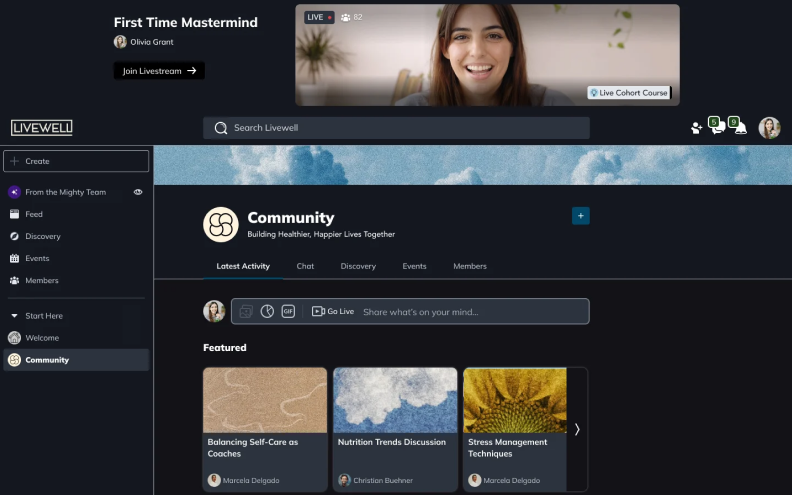
Mighty Networks is an AI-powered, comprehensive platform that, unlike traditional course platforms, focuses on community-driven learning and interaction, empowering users to create a central hub where community members can connect, share, and learn together.
What sets Mighty Networks apart is its focus on personalization and connection. Through its People Magic AI, the platform automatically connects members based on shared interests, boosting interaction and creating a sense of belonging. The customizable “Spaces” allow course creators to organize content, courses, and events into flexible containers tailored to their needs, with no coding required. Additionally, Mighty Networks offers native live streaming, interactive discussion boards, and monetization tools.
For those looking to fully own their brand experience, Mighty Networks provides the ability to create white-labeled mobile apps, offering a seamless and professional interface for subscribers.
Standout features
- Community-centered design. Combines social networking capabilities like member profiles, activity feeds, direct messaging, and discussion forums with the ability to host online courses and events in a single, centralized platform.
- People Magic AI. This connects the most relevant and interesting people in the context of community, courses, events, and memberships.
- Customizable spaces. Flexible, no-code containers that can house courses, events, or discussions, tailored to the creator’s needs.
- Integrated monetization tools. Allows course creators to sell memberships, courses, and event tickets in over 135 currencies, with bundling options for increased revenue.
- Multi-tier membership options. Offer various membership levels, each with access to different community spaces, courses, or perks, enabling course creators to cater to diverse audiences and price points.
Pros
- Unlimited members, spaces, hosts, and moderators
- Native mobile app for iOS and Android
- Customer support is included in all plans
- 1-3% transaction fee
- An opportunity to add your logo, colors, and graphics
Cons
- Community plan doesn’t allow the selling of courses: it doesn’t include course creation, video upload, quizzes and tests
Pricing
Mighty Networks offers four plans:
- Community — $41/month.
- Courses — $99/month.
- Business — $179/month.
- Path-to-Pro — $360/month.
- Mighty Pro — starts at $2,000 per month.
Billed annually.
Best for
This alternative to Kajabi is the perfect choice for those who prioritize creating a strong, interactive, and deeply connected audience. However, it isn’t a good Kajabi alternative if you mostly focus on selling online courses rather than membership.
8. Vonza
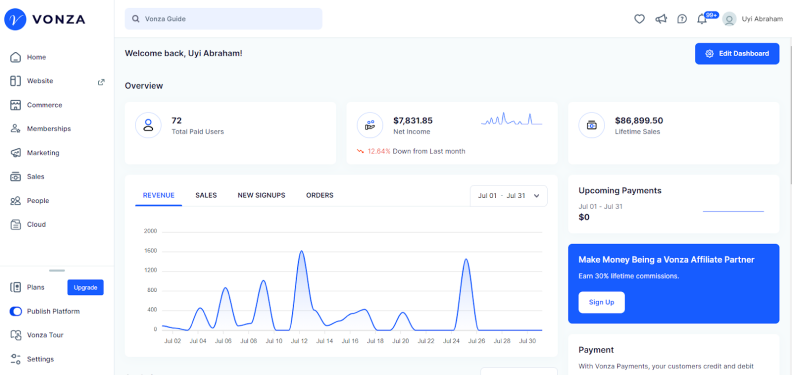
Vonza is an all-in-one business platform designed to streamline the creation, marketing, and sale of online courses, digital products, and memberships. Vonza integrates a comprehensive suite of tools, including website building, email marketing, sales funnels, and scheduling, into a single, user-friendly interface.
One of the standout features of Vonza is its school management system, designed specifically for universities and educational institutions. This robust tool handles everything from student admissions and scheduling to curriculum management, finances, and transcripts, making it ideal for larger-scale educational programs.
With its automation features, Vonza takes care of repetitive tasks like email sequences, workflows, and payment processing, freeing up time for course creators to focus on growth. Its intuitive drag-and-drop tools and customizable templates allow users to build websites, course pages, and sales funnels with ease, even if they have no technical expertise.
Standout features
- Drag-and-drop website builder. Create customized websites and course pages easily with no coding required.
- Robust analytics. You can track sales funnels, course performance, member engagement, and marketing efforts with Vonza’s in-depth reports.
- eCommerce integration. Build an online store to sell both digital and physical products alongside online courses and memberships.
- Global payment support. Accept payments in over 130 currencies, enabling course creators to sell courses, memberships, and products worldwide.
- Marketing automation tools. It’s easy to simplify workflows with automated email campaigns, payment processing, and marketing sequences, saving time and effort.
Pros
- No transaction fee
- 24/7 customer support, online community, and training from Vonza University
- Quick and easy setup
- Free migration
- Integrated AI tools
Cons
- Graded quizzes and exams are only included in the Growth plan and the Business plan
- Lots of limitations in cheaper plans
Pricing
Vonza alternative to Kajabi offers four plans:
- Basic — $32.50/month.
- Starter —$69/month.
- Growth — $179/month.
- Business — $349/month.
Billed annually.
Best for
Vonza’s all-inclusive nature, coupled with its focus on accessibility and functionality, makes it an ideal solution for individuals and organizations looking to scale their online presence while managing all aspects of their business from a single powerful platform.
Kajabi Alternatives: Final Thoughts
Think about your goals, the type of courses you want to sell, your budget, and other requirements, and choose the best Kajabi alternative.
Don’t know where to start? Don’t hesitate to book a live consultation with our eLearning manager to see iSpring LMS in action and decide if it’s right for your training needs.




